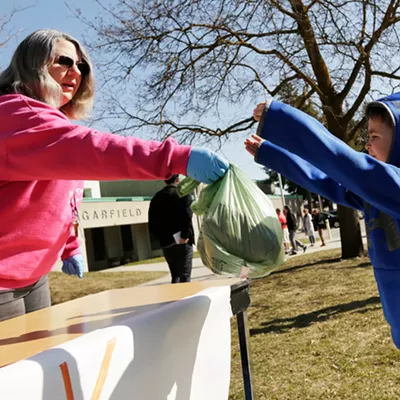Rowan McLean, a 7-year-old in a cartoon vampire shirt at Sheridan Elementary, has been going through some pretty tough times lately. Her parents are divorcing. Sometimes she feels lonely at lunch. She gets in trouble occasionally. But on Tuesdays she sees Kristy, and everything’s all right.
“I was jumping up and down because I saw her,” McLean says. Kristy’s her officially assigned mentor. They eat lunch together, they play board games like Operation, they talk about tough stuff. It’s sort of like the Big Brothers Big Sisters program, with one difference: A local church has sent these volunteers.
Kristy comes from the Life Center Foursquare Church, which has adopted Sheridan Elementary.
But it’s not just Sheridan Elementary and Life Center. As schools struggle and the number of those living in poverty increases, churches across the nation are bringing aid.
Since 2002, Spokane Public Schools has cut $45 million from its budget, laying off teachers, reducing support staff and eliminating programs. This year, the number of mentors from Life Center alone has tripled.
“I think the economic situation has made people realize they have to help out in their community for their society,” says Hamblen Elementary School Principal Rita Forsythe. Her school gets volunteers from nearby Hamblen Park Presbyterian Church.
Religion
and public education have often been separate, even adversarial.
Centuries after Thomas Jefferson wrote of “building a wall of separation
between Church & State,” people still argue about what he meant.
But these local churches and schools are finding ways to collaborate.
Sheridan Elementary is an aging school in Spokane’s East Central neighborhood, where over 80 percent of the students come from families poor enough to qualify for free or reduced lunch.
Across town, in Life Center’s sprawling $8 million building, eight members run the espresso stand in the lobby during Sunday services, and massive screens play professionally produced videos before thousands of congregants.
“We have this pool of 4,000 people,” says Bill Kafflen, associate pastor at Life Center, of the church’s members. “Some of them want to get involved or do something in the community.”
The video screens advertise the Sheridan mentor program — and the number of weekly volunteers has already grown from 18 last year to more than 50 this year. In August and September, a sign at the espresso shop let coffee drinkers know that any profits after the cost of supplies and labor at the shop went to buy necessities for children at Sheridan.
It echoes work going on in Dallas for the last 20 years. Oak Cliff Bible Fellowship, a megachurch with 8,000 congregants run by the well-known Christian broadcaster Tony Evans, has adopted 68 public schools in the Dallas area. The church provides everything from mentorship and school clothes to English language tutoring. For the past six years, they’ve been running the National Church Adopt-A-School Initiative, urging every church in America to take a local school under their wings.
“It’s a bigger issue now,” says the initiative’s executive vice president, Bill Collins. “You’ve got worse family deterioration now and the worst graduation rates since public school started.”
He believes it’s the church’s job to help solve these social problems.
“If the government could have fixed it, they would have fixed it,” Collins says. “The church has the largest group of volunteers of any institution in America. We ask the church to get involved in the public schools, to get involved in mentoring, tutoring and life skills education.”
In Spokane, plenty of churches have been doing just that. And it’s not just the large churches like Life Center. Emmaus, a church with only about 75 congregants, donated $2,400 to Grant Elementary last year — to use on whatever it wants — and plans to donate $2,500 this year.
A Hamblen school employee — and Hamblen Park Presbyterian Church member — runs an after-school tutoring program for Hamblen Elementary and has used the church bulletin to recruit volunteers.
Nearby Shadle Park Presbyterian Church has donated school supplies and created parenting classes. Fourth Memorial Church gave 65 backpacks filled with school supplies to Logan Elementary and sponsored a school barbecue.
“They’re close, close, close neighbor-wise,” says Lisa Pacheco, principal of Logan Elementary. “They just are totally, totally involved with our school.”
Some churches contacted the schools directly. Life Center went through Communities in Schools of Spokane County, a local organization that aims to connect students in need with community resources.
“The strategy is to not leave any stone unturned,” says Chuck Tiernan, development director for Communities in Schools of Washington State. “Any group that organizes itself would be a great place to say, ‘Can I communicate with your membership?’” None of the schools or organizations interviewed said there had been any controversy or opposition regarding their partnerships with the church, but the relationship between religion and school has long posed legal problems.
This Monday, the American Civil Liberties Union chided a district for bringing in a Christian rapper to perform at and minister to an assembly. To avoid violating the state or federal constitutions, programs have to be open to volunteers of all religions, and volunteers can’t direct conversation toward religious topics, says Doug Honig, spokesman for the ACLU of Washington.
At Sheridan, Life Center’s mentors are specifically trained to avoid bringing up religion.
“As a church, we are not going in to convert students, to profess religious beliefs,” says M.L. Harvey, a counselor at Sheridan Elementary who helps run the mentoring program and who is a Life Center attendee. “If somebody, point blank, asks me, I will say, ‘Yes, I do believe.’” Back at Sheridan, on a sunny Friday afternoon, 39-yearold mentor James Cannon tosses a foam football around with the sixth-grader he’s mentoring. He saw the general notice in the bulletin at Life Center, felt called to help out, and became one of the first mentors at Sheridan.
“As a Christian, service should characterize my life,” he says. “Faith isn’t bound by secular limitations.”

























